- Home
- Dan Simmons
A Winter Haunting Page 2
A Winter Haunting Read online
Page 2
“You never explained why your friend Duane called his home The Jolly Corner,” said Dr. Hall. “Did he see it as a happy place? You said that the boy lived with just his father and that his father was an alcoholic. Was he being ironic? Is it possible that an eleven-year-old would use such irony, or have you supplied that irony in the decades since then?”
Dale hesitated, not sure how to respond. He was embarrassed that Hall did not recognize the allusion to “The Jolly Corner.” If his psychiatrist didn’t know Henry James, how smart could he be? Should he tell Hall that Duane hadn’t told him about “The Jolly Corner” when he was eleven—Duane had died at age eleven—but had used that name for his farm when Dale had first moved to Elm Haven in 1956, when both boys were eight? An eight-year-old hick farm kid had known the Henry James story, and now Dale’s $125-an-hour shrink had never heard of it.
“I think Duane McBride is the only real genius I’ve ever met,” Dale said at last.
Dr. Hall sat back in his chair. Dale thought that for a psychiatrist, Hall did not have a very good poker face. He could see the skepticism in the doctor’s slight rise of eyebrows and forced neutral expression.
“I know,” continued Dale, “genius is a powerful word. I don’t use it often . . . hell, I never use it. And I’ve met a lot of powerfully intelligent people in my lifetime—writers, academics, researchers. Duane is the only genius I’ve known.”
Dr. Hall nodded. “But you knew him only as a child.”
“Duane didn’t live long enough to get out of childhood,” said Dale. “But he sure was a strange kid.”
“How so?” Dr. Hall put his yellow notepad on his lap and clicked his ballpoint pen open—a habit that Dale found distracting and vaguely annoying.
Dale sighed. How could he explain? “You would had to have met Duane, I think, to understand. On the outside, he was a big slob of a farm kid—fat, sloppy, lousy haircut. He wore the same flannel shirt and corduroy pants all the time, summer and winter. And remember, this was back in 1960—kids actually dressed up for school in those days, even in little hick towns like Elm Haven, Illinois. Nothing fancy, but we had school clothes and play clothes and knew the difference, not like the slobs in school today . . .”
Dr. Hall’s supposedly neutral expression had shifted to the very slight frown that signaled that Dale had wandered from the subject.
“Anyway,” said Dale, “I met Duane shortly after my family moved to Elm Haven when I was in fourth grade, and right away I knew that Duane was different—almost scary, he was so smart.”
“Scary?” said Dr. Hall, making a note. “How so?”
“Not really scary,” said Dale, “but beyond our understanding.” He took a breath. “All right, summer after fifth grade. The bunch of us boys used to hang around together in a sort of club we called the Bike Patrol, like a junior Justice League of America . . .”
Dale could tell that Hall had no idea what he was talking about. Perhaps male psychiatrists had never been boys. That would explain a lot.
“Anyway, our clubhouse was in Mike O’Rourke’s old chicken coop in town,” continued Dale. “We had a sprung sofa in there, an old easy chair from the dump, the shell of a console radio . . . that kind of crap. I remember one night in the summer after fifth grade when we were bored and Duane started telling us the story of Beowulf . . . word for word. Night after night, reciting Beowulf from memory. Years later, when I read the epic in college, I recognized it . . . word for word . . . from Duane’s storytelling on those summer evenings.”
Hall nodded. “That’s unusual for someone that age, to even know of Beowulf.”
Dale had to smile. “The unusual part was that Duane told it to us in Old English.”
The psychiatrist blinked. “Then how did you understand . . .”
“He’d rattle on in Old English for a while and then translate,” said Dale. “That autumn, he gave us a bunch of Chaucer. We thought Duane was weird, but we loved it.”
Dr. Hall made a note.
“Once we were hanging around and Duane was reading a new book . . . I think it was something by Truman Capote, obviously a writer I’d never heard of at the time . . . and one of the guys, I think it was Kevin, asked him how the book was, and Duane said that it was okay but that the author hadn’t gotten his characters out of immigration yet.”
Dr. Hall hesitated and then made another note. Maybe you don’t understand that, thought Dale, but I’m a writer—sometimes I’m a writer—and I’ve never had a goddamned editor make a remark that insightful.
“Any other manifestations of this . . . genius?” asked the psychiatrist.
Dale rubbed his eyes. “That summer Duane died, 1960, a bunch of us were lying in a hammock out at Uncle Henry and Aunt Lena’s farm, just down the road from The Jolly Corner, it was night, we were looking at the stars, and Mike O’Rourke—he was an altar boy—said that he thought that the world all existed in the mind of God and he wondered what it would be like to meet God, to shake hands with Him. Without hesitating a second, Duane said that he’d worry about that because he suspected that God spent too much time picking His mental nose with His mental fingers . . .”
Dr. Hall made no note, but he did look at Dale almost reproachfully. “Your friend Duane was an atheist, I take it?”
Dale shrugged. “More or less. No, wait . . . I remember Duane telling me one of the first times we hung out together . . . we were building a three-stage rocket in fourth grade . . . he told me that he’d decided that all the churches and temples to the currently fashionable gods . . . that’s what he called them, ‘the currently fashionable gods’ . . . were too crowded, so he’d chosen some minor Egyptian deity as his god. Learned the old prayers, studied the rituals, the whole nine yards. I remember him telling me that he’d considered worshiping Terminus, the Roman god of lawn boundaries, but had decided on this Egyptian god instead. He thought the Egyptian god had been ignored for many centuries and might be lonely.”
“That is unusual,” allowed Dr. Hall, making a final brief note.
Now Dale did have to grin. “If I remember correctly, Duane taught himself how to read Egyptian hieroglyphics just for that purpose—to pray to his forgotten little god. Of course, Duane spoke eight or nine languages by the time he died at age eleven and probably read a dozen more.”
Dr. Hall set aside his yellow legal pad, a sure sign that he was becoming bored with the topic being discussed. “Have you had any more dreams?” he asked.
Dale agreed that it was time to change the subject. “I had that dream about the hands again last night.”
“Tell me about it.”
“It was no different than the previous ones.”
“Yes, Dale, that’s more or less the definition of ‘recurring dreams,’ but it’s interesting how one can find slight but important differences when the dreams are actually discussed.”
“We haven’t discussed dreams much.”
“That’s true. I’m a psychiatrist but not—as you know—a psychoanalyst. But tell me about the hands dream anyway.”
“It was the same as always. I’m a kid again—“
“How old?”
“Ten, eleven, I don’t know. But I’m in our old house in Elm Haven. Sleeping in the upstairs room with my little brother, Lawrence . . .”
“Go on.”
“Well, Lawrence and I are talking, there’s a night light on, and Lawrence drops a comic book. He reaches down and . . . well, this hand comes out from under the bed and grabs him by the wrist. Pulls him down.”
“A pale hand, you said last time.”
“Yes. No. Not just pale, white . . . grub white . . . dead white.”
“What else about the hand . . . or is it hands, plural?”
“Just one hand at first. It grabs Lawrence by the wrist and pulls him off the bed before either one of us can react. The hand—the white hand—is weird, long fingers . . . I mean, way too long . . . eight or nine inches long. Spiderlike. Then I grab Lawrence by the legs . . .”<
br />
“He has already been pulled under the bed at this point?”
“Just his head and shoulders. He’s still screaming. That’s when I see both of the spidery white hands, pulling and cramming him under the bed.”
“And sleeves? Cuffs? Bare arms?”
“No. Just the white hands and blackness, but blackness darker than the dark under Lawrence’s bed. Like the sleeves of a black velvet robe, perhaps.”
“And you don’t succeed in saving your brother?”
“No, the hands pull him under and then he’s gone.”
“Gone?”
“Gone. As if a hole has opened up in the wooden floor and the hands had pulled him in.”
“But your brother—in real life—is still alive and well.”
“Yes. Sure. He runs an insurance investigation agency in California.”
“Have you discussed this dream with him?”
“No. We don’t see each other that much. We talk occasionally on the phone.”
“But you’ve never mentioned the dream?”
“No. Lawrence . . . well, he’s a big, gruff guy sometimes, but he’s also sensitive . . . he doesn’t like talking about that summer. Or about his childhood, actually. He had a rough time as a teenager in Chicago and had sort of a nervous breakdown after he dropped out of college.”
“Do you think that he also has memory gaps about that summer of . . . when was it?”
“1960.”
“Do you think that he has the same gaps?”
“No. I don’t know. I doubt it. He just doesn’t like talking about it.”
“All right. Back to the dream itself. How do you feel when you lose this . . . tug of war . . . and your younger brother disappears?”
“Scared. Angry. And . . .”
“Go on.”
“Relieved, I guess. That the hands had grabbed Lawrence instead of me, I think. Dr. Hall, what the hell does this mean?”
“We discussed the fact that dreams don’t have to mean anything, Dale. But there almost certainly is a reason for having them. It sounds like a straightforward anxiety dream to me. Do you feel anxiety about the months ahead?”
“Sure I do. But why this dream?”
“Why do you think anxiety shows itself through this dream?”
“I have no idea. It couldn’t be a repressed memory?”
“You think that you have an actual memory of white hands dragging your little brother under the bed?”
“Well . . . or something like that.”
“We discussed repressed memories. Despite all the movies and TV talk about them, they are actually very, very rare. And a repressed memory would deal with a real event, such as physical or sexual abuse, not a fantasy nightmare. What is it? I can tell by your face that you’re disturbed.”
“Well, it wasn’t the recurring nightmare that woke me up last night.”
“What was it?”
“A sound. A scrabbling noise. Under my bed. Is our time up?”
“Just about. I do have one final question.”
“Shoot,” said Dale.
“Why go all the way to your childhood friend’s house in Illinois to write this book? Why leave everything you know, everything you have in life, and go back to this empty house in a state you haven’t lived in for forty years?”
Dale was silent for a full minute. Finally he said, “I have to go back. Something’s waiting for me there.”
“What, Dale?”
“I have no idea.”
To get to Duane McBride’s farmhouse when he was a kid, Dale had pedaled his bike about a mile and a half west on the gravel of Jubilee College Road, turned north on County 6, an even narrower gravel road, passed the Black Tree Tavern on his left, swooped down and up two steep hills, past the Calvary Cemetery where Elm Haven’s Catholics were buried, and then straight on another half-mile of flat road to the farm.
Jubilee College Road had been paved and widened. The Black Tree Tavern was gone, as far as Dale could tell in the dark—the building torn down, a cheap mobile home tucked in under the trees where yellow bulbs on wires had once hung—and County 6 here had also been asphalted and widened. These two hills had been death traps when Dale had lived here: wide enough for only one car, slick with gravel, dark even on sunny days with the overarching trees and the weeds coming right to the edge of the road, no shoulders for escape. It was exciting to pedal down and then coast up them on a bike, trying to keep on the hardened ruts of the road, and even the adults tended to play an elaborate game of chicken on the hills, accelerating their cars and pickup trucks down them in a cloud of dust and gravel and roaring to the top of the next hill with only the hope that no car was doing the same coming the other way. Frequently the drivers were drunken farmers headed home from the Black Tree. Uncle Henry and Aunt Lena—who had lived in the neat little farmhouse just beyond the hills—had always joked that Calvary Cemetery had been put where it was—on the top of the middle hill—just to save everyone the bother of dragging the victims of the car wrecks back to town.
Now the asphalted road was easily wide enough for two cars to pass, and the woods and weeds had been cut back on either side.
Dale pulled the Land Cruiser onto the grassy berm outside the Calvary Cemetery, stopped the engine, left the headlights on, and stepped out into the night.
The wind had come up more strongly now, and the low clouds seemed to be rushing by just yards overhead. There were no stars. The cemetery’s tall black iron gate and the long spiked iron fence were visible in the headlights and looked just as he remembered them, except for the fact that they appeared to have grown black bat wings or witches’ robes—long, flapping streamers of what seemed to be black crêpe paper. It was no illusion. Dale could hear the frenzied flapping of the streamers and see different lengths of tattered black material waving and blowing eastward along the full length of the fence and all around the arched gate.
Corn husks, thought Dale. “Shucks,” we used to call them. He had seen this post-harvest phenomenon when he was a kid here, and he often thought of it on windy days in Montana when tumbleweeds lined the fences of the highways. To the east of the cemetery, across County 6, had been Old Man Johnson’s farm when Dale was a boy, and whoever now owned the land still raised corn. Hundreds of these dried shucks and husks had blown from the field and tangled themselves on the black iron gate after the harvest.
Harvested by a combine with rolling-chain corn pickers, just like the machine that killed Duane. Had Duane’s torn clothes and flesh flown through the night wind like this, catching and flapping on some barbed-wire fence along this road?
Dale shook his head. He was very tired.
Dale had no family in the cemetery—his folks had not been Catholic—but he knew that the O’Rourkes and many of his other Elm Haven friends and acquaintances had people buried there. Some of those old friends of mine are probably buried there now as well, he thought. He would come back in the daylight and check. He would have plenty of time in the coming weeks. He climbed back into the Land Cruiser, started the engine, and headed down the next hill, leaving the flapping, waving, crackling apparitions behind.
It was another mile to Duane McBride’s farm. Dale passed his great-aunt Lena and uncle Henry’s farm to the right—the house was dark—and wondered who lived there now. Uncle Henry had died in 1970, but someone had told Dale that Aunt Lena was still alive in a home in Peoria—suffering from Alzheimer’s, beyond communication for the last two decades or so, but still living. If the report was true, then the old woman had lived through parts of three centuries. Dale shook his head at the thought. What would it be like to outlive one’s spouse by more than thirty years? He felt a lurch in his belly at the thought. He no longer had a spouse, and the idea still seemed strange to him.
He almost missed the driveway to the McBride farm. The place had always been marked by two things—Mr. McBride’s refusal, because of his late wife’s request, to grow corn that would conceal the farmhouse from the world, and vice
versa, in summer, and a quarter-mile of flowering crabapple trees that had lined the lane.
Now the fields were stubbled with still-standing stalks of harvested corn and most of the crabapple trees were gone. Dale knew just enough about farming to know that the remaining stalks meant that whoever was farming this land was using the “plain-tilling” method.
Dale drove slowly down the lane. When his headlights illuminated the dark farmhouse, his first thought was, Jesus, it’s smaller than I remember.
The place was dark, of course, without even the usual farmer’s pole light illuminating the area between the house and the sheds and barn. There was a front door, but Duane and his father had never used it, so Dale pulled around the side of the house and looked at the side door. Sandy Whittaker, the real estate agent, had said that no one could find a key but that it would not be locked and that the power would be turned on by the time Dale arrived.
He left the engine running to keep the headlights on the doorway as he trotted over. Both the screen and the inner doors were unlocked. Dale stepped into the kitchen.
He raised his hand to his face and almost jumped back outside. The place smelled terrible—rotten, musty, decayed, worse. Something had died in there.
He flicked the light switch. Nothing. The place was as dark as an unlighted cave, with only the slightest hint of light through the one kitchen window.
Dale went back out to the truck, grabbed his halogen flashlight, and went back in.
The kitchen looked as if it had been abandoned in mid-meal. There were plates on the counter and more in the sink. The stench grew stronger with each step he took, and Dale covered his mouth and nose with one hand as he crossed into the dining room.
Jesus, the place is full of children’s coffins. Dale froze in place, flicking the light in all directions. Instead of one dining room table, there were six or eight rough benches set on sawhorses, and on each bench was a long, dull-metal box the size and shape of a small coffin. Then he saw the slots for punch cards, rudimentary keyboards, and small windows on the metal boxes.
Learning machines, Dale remembered. Duane’s Old Man—always his friend’s affectionate term for his father—had been an inventor. These were the pre-electronic “learning machines” that the Old Man had always been tinkering with, never completing to his satisfaction, and rarely selling.

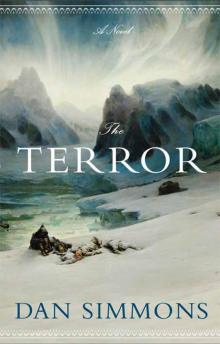 The Terror
The Terror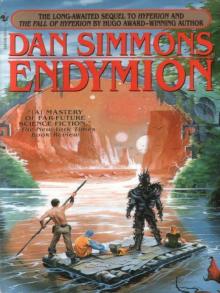 Endymion
Endymion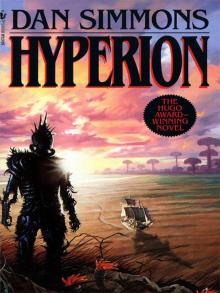 Hyperion
Hyperion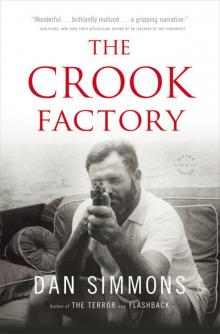 The Crook Factory
The Crook Factory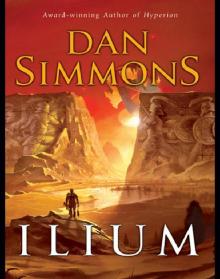 Ilium
Ilium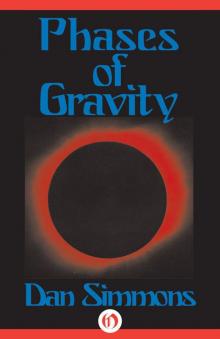 Phases of Gravity
Phases of Gravity Hardcase
Hardcase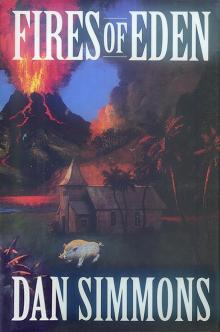 Fires of Eden
Fires of Eden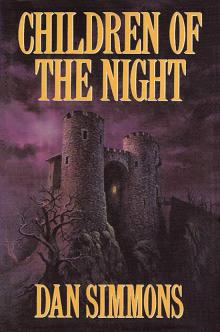 Children of the Night
Children of the Night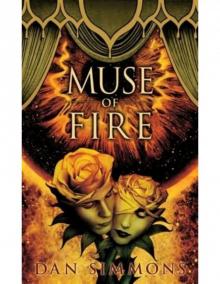 Muse of Fire
Muse of Fire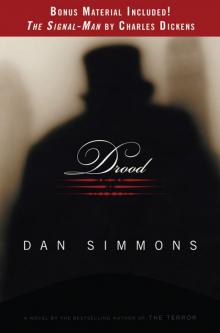 Drood
Drood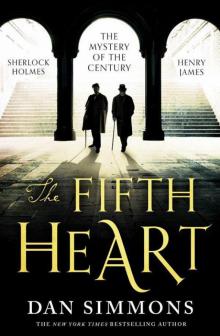 The Fifth Heart
The Fifth Heart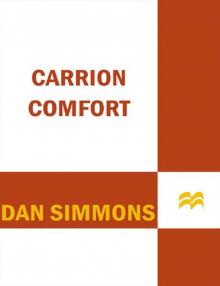 Carrion Comfort
Carrion Comfort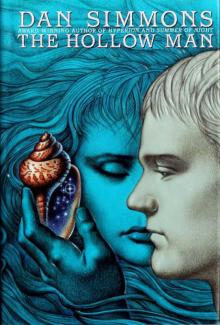 The Hollow Man
The Hollow Man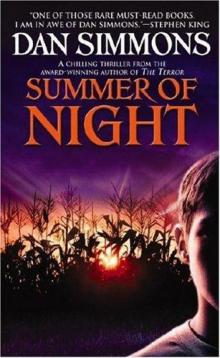 Summer of Night
Summer of Night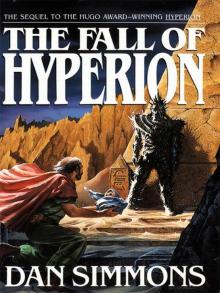 The Fall of Hyperion
The Fall of Hyperion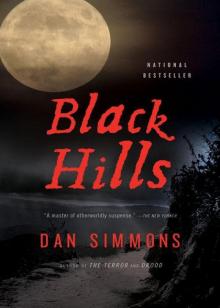 Black Hills
Black Hills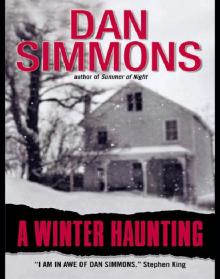 A Winter Haunting
A Winter Haunting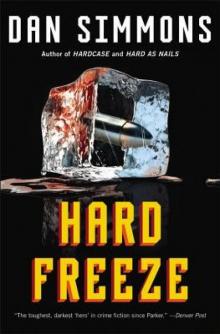 Hard Freeze
Hard Freeze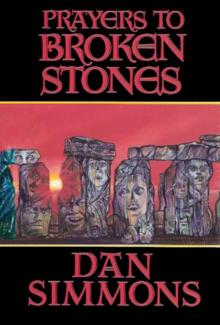 Prayers to Broken Stones
Prayers to Broken Stones Hard as Nails
Hard as Nails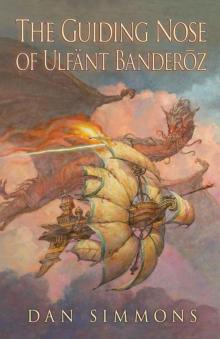 The Guiding Nose of Ulfant Banderoz
The Guiding Nose of Ulfant Banderoz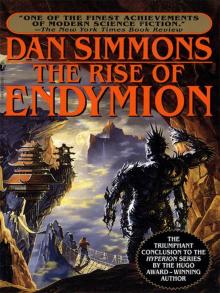 The Rise of Endymion
The Rise of Endymion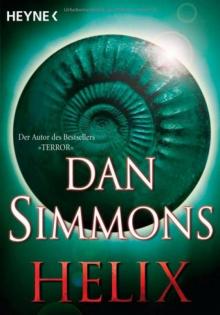 Orphans of the Helix
Orphans of the Helix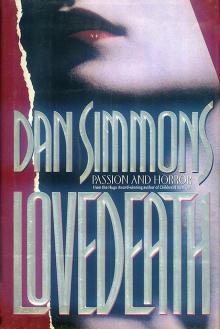 Lovedeath
Lovedeath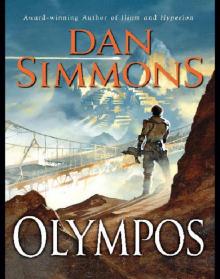 Olympos
Olympos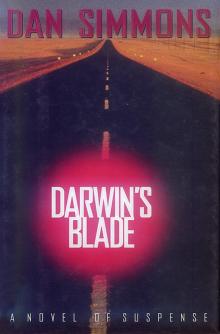 Darwin's Blade
Darwin's Blade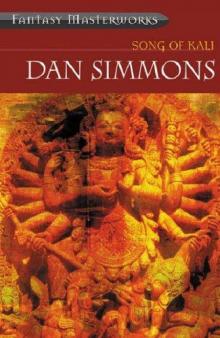 Song of Kali
Song of Kali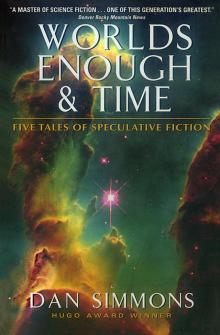 Worlds Enough & Time: Five Tales of Speculative Fiction
Worlds Enough & Time: Five Tales of Speculative Fiction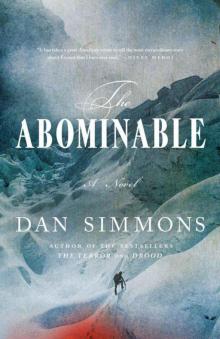 The Abominable
The Abominable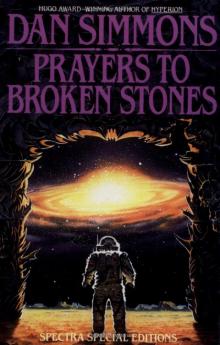 The Death of the Centaur
The Death of the Centaur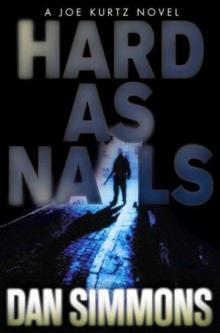 Hard as Nails jk-3
Hard as Nails jk-3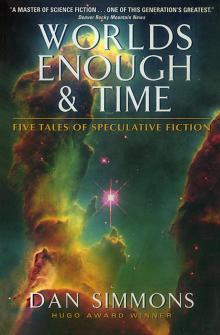 Worlds Enough & Time
Worlds Enough & Time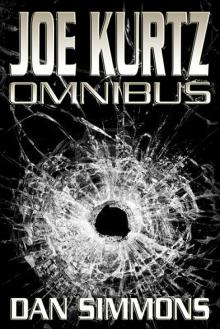 Joe Kurtz Omnibus
Joe Kurtz Omnibus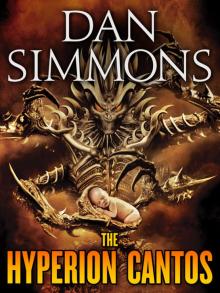 The Hyperion Cantos 4-Book Bundle
The Hyperion Cantos 4-Book Bundle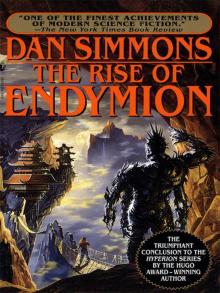 Rise of Endymion
Rise of Endymion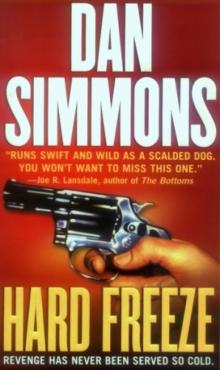 Hard Freeze jk-2
Hard Freeze jk-2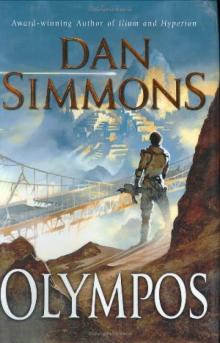 Olympos t-2
Olympos t-2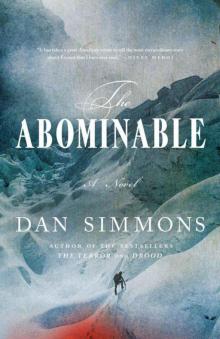 The Abominable: A Novel
The Abominable: A Novel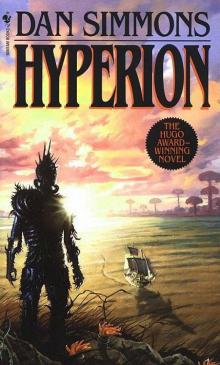 Hyperion h-1
Hyperion h-1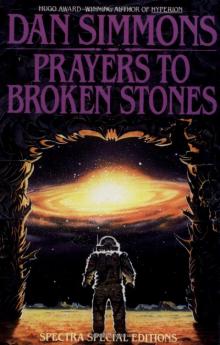 Remembering Siri
Remembering Siri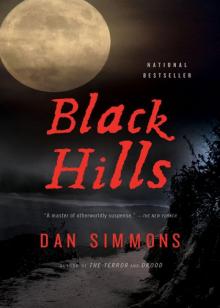 Black Hills: A Novel
Black Hills: A Novel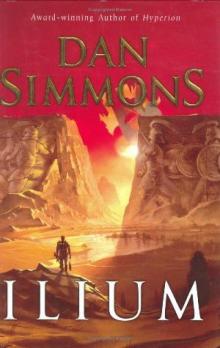 Ilium t-1
Ilium t-1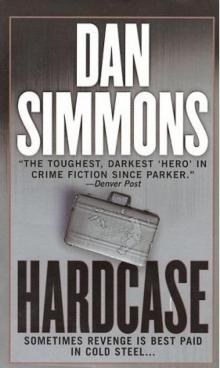 Hardcase jk-1
Hardcase jk-1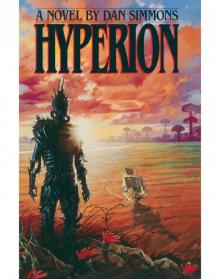 Hyperion 01 - Hyperion
Hyperion 01 - Hyperion